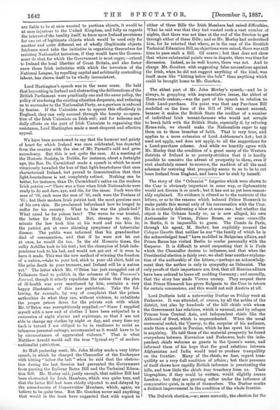The story of the "Orleanist " forgeries which were shown
to the Czar is obviously important in some way, or diplomatists would not discuss it so much; but it has not as yet been reason- ably explained. No evidence is offered as to the contents of the letters, or as to the reasons which induced Prince Bismarck to make public this morsel only of his conversation with the Czar. He is evidently delivering a blow at some one; but whether the object is the Orleans family or, as is now alleged, his own Ambassador in Vienna t Prince Remit or some camarille in Berlin, it is impossible to guess. The Comte de Paris, through his agent, M. Bocher, has explicitly assured the Cologne Gazette that neither he nor "the family of which he is the acknowledged head" have meddled in Bulgarian affairs, and Prince Reuss has visited Berlin to confer personally with the Emperor. It is difficult to avoid suspecting that it is Paris which the Chancellor desires to influence, and that when the Presidential election is fairly over, we shall hear another explana- tion of the authorship of the letters,—perhaps an acknowledg- ment that the author is only in sympathy an Orleaaist. The only proofs of their importance are, first, that all Russian editors have been ordered to leave off scolding Germany ; and secondly, that the story has made Vienna uneasy. They suspect there that Prince Bismarck has given Bulgaria to the Czar in return for certain concessions, and this would not suit Austria at all.









































 Previous page
Previous page